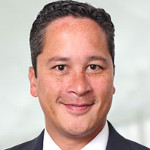 Stradley Ronon announced that commercial litigation and insurance attorney Mark D. Villanueva has joined the firm as a partner in its Philadelphia office. He was most recently a partner with McCarter & English.
Stradley Ronon announced that commercial litigation and insurance attorney Mark D. Villanueva has joined the firm as a partner in its Philadelphia office. He was most recently a partner with McCarter & English.
Villanueva represents clients in commercial litigation matters, having amassed extensive litigation experience at the trial and appellate levels in state and federal courts and in arbitration proceedings. He also counsels clients in the negotiation and drafting of commercial contracts and sponsorship agreements. Villanueva has worked with companies in numerous industries, including insurance, energy, oil and gas, financial services, pharmaceutical and health care.
Villanueva brings with him to Stradley Ronon significant litigation, transactional and intellectual property matters, the firm said in a release.
“Mark is widely regarded as one of the region’s top young attorneys, and we are thrilled to have him join Stradley Ronon,” said firm Chairman William R. Sasso. “His commercial litigation and insurance experience complements our existing practice areas and further advances our mission of providing clients with skilled attorneys committed to providing value-driven results.”
“Joining Stradley Ronon gives me a large, sophisticated and highly visible platform from which to serve my clients,” said Villanueva. “While I was familiar with the firm’s deep roster of legal talent in areas such as litigation, insurance, intellectual property and corporate law, I was just as impressed with its commitment to responsive, efficient, comprehensive client service, which is particularly attractive to my contacts.”
Stradley Ronon’s nationally recognized insurance practice group counsels leading insurers, reinsurers and producers, and, when necessary, litigates on their behalf. The firm helps insurers resolve disputes regarding the full spectrum of commercial and individual coverage lines, including transactional and regulatory matters and complex claims and litigation. In addition, Stradley Ronon’s complex commercial litigation practice represents public and private companies in a wide range of industries on litigation issues including securities fraud allegations, director and office liability, merger and acquisition disputes, shareholder disputes, intellectual property claims, business torts, contract claims and lender liability matters. The firm’s litigation practice group was recognized by The Legal Intelligencer as one of the top litigation departments in Pennsylvania.
“Mark’s unique combination of business savvy and courtroom experience strengthens the capabilities of our growing corporate and litigation teams,” said Stradley Ronon Insurance Practice Group Chair Steven B. Davis “His passion for the law and commitment to client service will instantly resonate with our client base.”
Prior to joining McCarter & English, Villanueva clerked for the Honorable Paul S. Diamond of the U.S. District Court for the Eastern District of Pennsylvania. He began his legal career as an associate at Drinker Biddle. Villanueva was honored as one of The Legal Intelligencer’s “Lawyers on the Fast Track.”
He received his J.D. magna cum laude from The Catholic University Columbus School of Law, where he was notes and comments editor of The Catholic University Law Review, and his B.A. from Bucknell University.
About Stradley Ronon Stevens & Young
Counseling clients since 1926, Stradley Ronon has helped private and public companies – from small businesses to Fortune 500 corporations – achieve their goals by providing pragmatic, value-driven legal counsel, the release said. The firm has seven offices throughout the mid-Atlantic region.
 The term “Peak oil” is the theory that oil production has maxed out and that decline is therefore inevitable, writes Mona Dajani in a white paper published by Baker & McKenzie. “The oil market is in a state of confusion, though several developments may serve to halt the momentum depending on their respective outcomes,” she writes.
The term “Peak oil” is the theory that oil production has maxed out and that decline is therefore inevitable, writes Mona Dajani in a white paper published by Baker & McKenzie. “The oil market is in a state of confusion, though several developments may serve to halt the momentum depending on their respective outcomes,” she writes. Kane Russell Coleman & Logan
Kane Russell Coleman & Logan Stradley Ronon announced that commercial litigation and insurance attorney Mark D. Villanueva has joined the firm as a partner in its Philadelphia office. He was most recently a partner with McCarter & English.
Stradley Ronon announced that commercial litigation and insurance attorney Mark D. Villanueva has joined the firm as a partner in its Philadelphia office. He was most recently a partner with McCarter & English. China-based employers are required to have written employment contracts with all full-time employees, and if those contracts are not in place, the employer could be on the hook for double wages, reports Dan Harris on
China-based employers are required to have written employment contracts with all full-time employees, and if those contracts are not in place, the employer could be on the hook for double wages, reports Dan Harris on  Compliancy Group will present a complimentary webinar designed to help participants and their clients be compliant with healthcare regulations. The event will be Tuesday, August 18, at 2 p.m. Eastern time.
Compliancy Group will present a complimentary webinar designed to help participants and their clients be compliant with healthcare regulations. The event will be Tuesday, August 18, at 2 p.m. Eastern time. Kat Gallagher
Kat Gallagher The 8th Annual Law Department Operations (LDO) Survey, now known as the
The 8th Annual Law Department Operations (LDO) Survey, now known as the  In recent years, many software publishers began using software audits as a means to increase revenue by penalizing customers for perceived compliance issues, writes
In recent years, many software publishers began using software audits as a means to increase revenue by penalizing customers for perceived compliance issues, writes